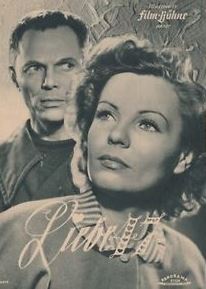
The Man Outside is a play by Wolfgang Borchert, written in a few days in the late autumn of 1946. It made its debut on German radio on 13 February 1947.
Wolfgang Georg Louis Liebeneiner was a German actor, film director and theatre director.
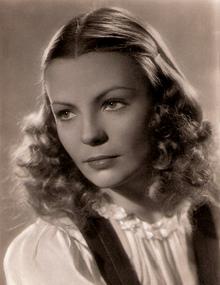
Hilde Krahl was an Austrian film actress. She appeared in 70 films between 1936 and 1994. She was born Hildegard Kolačný in Brod, Austria-Hungary in 1917, and she died in Vienna, Austria in 1999. In 1944 she married Wolfgang Liebeneiner; their daughter Johanna Liebeneiner also became a famous actress.

No Greater Love or Heart of the World is a 1952 West German historical drama film directed by Harald Braun. It was entered into the 1952 Cannes Film Festival. It was shot at the Bavaria Studios in Munich and on location in Berlin. The film's sets were designed by the art directors Hermann Warm and Robert Herlth.

A Devil of a Woman is a 1951 Austrian drama film directed by Wolfgang Liebeneiner and starring Hilde Krahl, Kurt Heintel and Bruno Hübner. It was entered into the 1952 Cannes Film Festival.

Hans Leibelt was a German film actor.

The Three from the Filling Station is a 1955 West German musical film directed by Hans Wolff and starring Adrian Hoven, Walter Müller and Walter Giller. It was shot at the Tempelhof Studios in West Berlin and on location around the city. The film's sets were designed by the art directors Kurt Herlth and Hans Kuhnert.

Between Yesterday and Tomorrow is a 1947 German drama film directed by Harald Braun and starring Hildegard Knef, Winnie Markus and Sybille Schmitz. It was part of both the cycle of rubble films and subgenre of hotel films. As with many other German rubble films, it examines issues of collective guilt and future rebuilding.

Target in the Clouds is a 1939 German drama film directed by Wolfgang Liebeneiner and starring Albert Matterstock, Leny Marenbach and Brigitte Horney. It was based on a novel by Hans Rabl. The film portrays the struggles of the fictional German aviation pioneer Walter von Suhr, an officer in the pre-First World War German army who saw the potential for military aircraft.
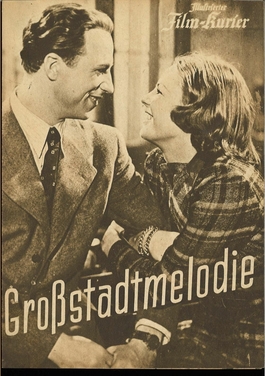
Melody of a Great City is a 1943 musical drama film directed by Wolfgang Liebeneiner and starring Hilde Krahl, Werner Hinz and Karl John. A young woman moves to Berlin to work as a press photographer.

Don't Promise Me Anything is a 1937 German comedy film directed by Wolfgang Liebeneiner and starring Luise Ullrich, Viktor de Kowa and Heinrich George. It was partly shot at the Grunewald Studios in Berlin. The film's sets were designed by the art directors Karl Weber and Erich Zander. The Berlin premiere took place at the Gloria-Palast. In 1950 Liebeneiner remade the film as When a Woman Loves with Hilde Krahl and Johannes Heesters in the lead roles.

Film Without a Title is a 1948 German comedy film directed by Rudolf Jugert and starring Hans Söhnker, Hildegard Knef and Irene von Meyendorff. It was made by Bavaria Film at the Emelka Studios in Munich in the American Zone of Occupation. Location shooting took place around Lüchow-Dannenberg in Lower Saxony. The film's sets were designed by the art directors Robert Herlth and Max Seefelder.

My Niece Susanne is a 1950 West German musical comedy film directed by Wolfgang Liebeneiner and starring Hilde Krahl, Inge Meysel and Harald Paulsen. It is set in Paris at the beginning of the twentieth century.

Abundance of Life is a 1950 West German romantic comedy film directed by Wolfgang Liebeneiner and starring Erika Müller, Ingeborg Körner, and Gunnar Möller. It was one of the last of the Rubble films made in the immediate post-war years. It updates a story by Ludwig Tieck to modern-day Hamburg, addressing the shortage of housing in the heavily bombed city.
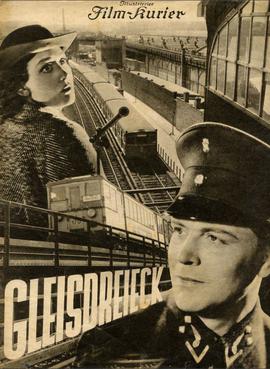
Dangerous Crossing or Rail Triangle is a 1937 German crime film directed by Robert A. Stemmle and starring Gustav Fröhlich, Heli Finkenzeller, and Paul Hoffmann. It is set amongst railway workers and takes its name from Gleisdreieck on the Berlin U-Bahn. It was partly shot at the Babelsberg Studios in Potsdam. The film's sets were designed by the art directors Carl Böhm and Erich Czerwonski. It was shot on location around Berlin. It premiered at the city's Ufa-Palast am Zoo.

What Am I Without You is a 1934 German musical comedy film directed by Arthur Maria Rabenalt and starring Wolfgang Liebeneiner, Betty Bird, and Olga Chekhova.

When a Woman Loves is a 1950 West German comedy film directed by Wolfgang Liebeneiner and starring Hilde Krahl, Johannes Heesters and Mathias Wieman. It is based on the play Don't Promise Me Anything by Charlotte Rissmann, which Liebeneiner had previously made into a 1937 film of the same title.

The Doctor's Secret is a 1955 Austrian-West German crime drama film directed by August Rieger and Karl Stanzl and starring Hilde Krahl, Ewald Balser and Erik Frey. It was shot at studios in Vienna. The film's sets were designed by art director Fritz Jüptner-Jonstorff.

One Woman Is Not Enough? is a 1955 West German drama film directed by Ulrich Erfurth and starring Hilde Krahl, Hans Söhnker and Rudolf Forster. It was shot at the Tempelhof Studios in West Berlin and on location in Munich and around Lake Starnberg. The film's sets were designed by the art directors Erich Kettelhut and Johannes Ott.
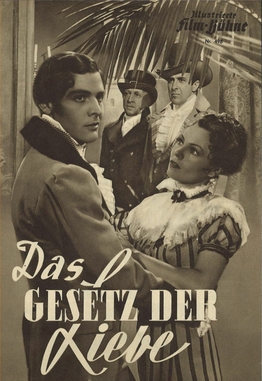
Law of Love is a 1949 German historical drama film directed by Hans Schweikart and starring Hilde Krahl, Paul Hubschmid and Ferdinand Marian. Production began in 1944 during the Nazi era and was completed by 1945, but the end of the Second World War led to delays in its distribution as also occurred with several other productions. It was not released for a further four years until its premiere in Erlangen, Bavaria in the newly established West Germany. Its West Berlin premiere took place in May 1950.
